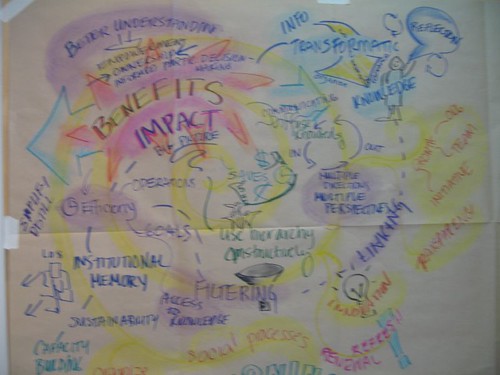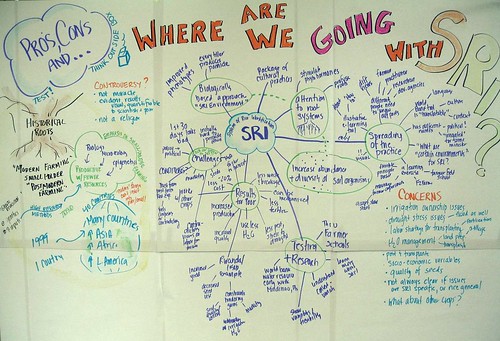Introduction
The blog has been quiet because I have been on the road for 18 days, first to Rome to co-facilitate the second CGIAR/FAO Knowledge Sharing Workshop face to face phase, then on for a quick stop in Prague (cheaper to fly to Israel from Rome via Prague) where I met my pen pal of 40 years face to face for the first time, and finally to my first time in the Middle East in Israel and Palestine.
Four countries, many sets of new and old relationships and a profoundly moving and challenging experience of a new set of complex cultures has left me so much to reflect on that it will take a while. But in the spirit of learning, I wanted to capture some of it here on the blog because it has, for me, profound connections to the work so many of us do around working and communicating across all kinds of lines. And how everything changes, always.
Even as I start typing this at 7 in the morning, I am amazed how it is so dark, for only 18 days ago the sun was up at this time of the morning. How the leaves changed and the last tomatoes gave up any chance of ripening. I was not the only thing changing. Everything changes. As we seek to facilitate change, we are changed.
Interspersed with this reflection will be personal stuff. Political stuff. It is unavoidable when we travel outside our home territories, to become vulnerable and open to new things. So if you read my blog for the more professional stuff, you may either have to skip these posts, or read them with whatever filter you need.
Part 1 – The Power of Doing TOGETHER
 I have been doing work with the Consultative Group on International Research (CGIAR) and the Food and Agricultural Organization (FAO) of the UN for many years. This year, I had the pleasure of doing work for them both at the same time as they collaborated on offering the second iteration of a Knowledge Sharing (KS) workshop some of us developed for the ICT-KM project of the CGIAR earlier this year. The workshop is a three phase online/face to face/online offering focused on learning about choosing and applying knowledge sharing tools and methods in the context of real work. Learn, do, revise, learn, do…. This time we had 35 people from around the world join the workshop with a variety of needs, levels of practice and, as always, time available to participate.
I have been doing work with the Consultative Group on International Research (CGIAR) and the Food and Agricultural Organization (FAO) of the UN for many years. This year, I had the pleasure of doing work for them both at the same time as they collaborated on offering the second iteration of a Knowledge Sharing (KS) workshop some of us developed for the ICT-KM project of the CGIAR earlier this year. The workshop is a three phase online/face to face/online offering focused on learning about choosing and applying knowledge sharing tools and methods in the context of real work. Learn, do, revise, learn, do…. This time we had 35 people from around the world join the workshop with a variety of needs, levels of practice and, as always, time available to participate.
We have learned from similar workshops in the past that the mixing of participants from different organizations has provided some specific benefits. The diversity gets us out of any of our own “organizational ruts.” You know — the things we think we can’t do in our own organizations, the barriers that we feel are always surrounding us. We tend to put those aside when we are with others. The diversity of experience and perspectives opens us up to seeing the work in a new way. What is less-than-useful social “chatter” for one is critical trust building process for another. If we can’t see these things at work in a group, we have a harder time understanding their role in our work. We tend to design knowledge sharing processes based solely on our own perspectives and preferences. When we learn about them in a diverse group, we see them in new ways. This was very present in our online and face to face phases. The diversity does present challenges, but with some persistence and reflection, we can process them as a useful part of the learning. Together.
The F2F workshop was three days of learning about knowledge sharing tools and methods while using them. We spent 1.5 days in Open Space learning about a variety of tools and methods. We used video, audio and graphic recording to debrief our Open Space experience. We broke the ice each day with different methods. We learned together while doing peer assists and Samoan circles. We brainstormed and picked topics with Dotmocracy to Speed Geek about new technologies. It is so hard to really get the essence of these tools and methods simply by reading about them or having them presented. But when you do them, and debrief them afterwards, the learning feels richer and deeper. From the informal participant feedback, this seems to be the case. I’ll be interested to learn more as we do the rest of our post-workshop evaluation.
Debriefing and Crystallizing Learnings
I want to call out specifically the importance of the debrief. After each session which used a knowledge sharing tool or method, we took time to debrief both the experience of the method, how it was facilitated and why it was chosen, leading to a brief discussion of when something may or may NOT be useful. We tried to capture all these debriefs in our wiki notes and blogs, and I hope over the course of the next few weeks, we can weave what we learned in the debriefs into the specific tool and method pages on our shared webbased resource, the KSToolkit. Recently there has been a very rich thread on the KM4Dev (development) email list about capturing lessons learned from F2F events. If you are interested in this topic, take a peek. Look for the posts entitled “Documentation: More than Just Minutes.”
My Key Learnings
- People make meaning through the construction of their own experience so having a chance to try methods like Speed Geeking and Open Space are important moments, even when we have other constraints which might suggest other methods.
- Give people ownership of their participation. At the start of the workshop I commented that many people had laptops open. I said I was not going to tell people to close or open them, but that they should make choices about their use of their laptops based both on their own needs and their perception of how their choices might impact others. In other words, we are responsible both for our own actions and to be attentive to the needs and actions of the group. This is right in line with Open Space’s “Law of Two Feet.” At the end of the workshop, a couple of people commented on how important this was for them, and how different from the “usual” where we are told what to do and how to do it.
- As I noted above, the power of debriefing and shared meaning making.
- Try to have your workshop close to lodgings. It took a lot of energy to get us from our hotels in Rome out 30 minutes to our meeting location. The location and hosting of our workshop by Bioversity was fantastic, but the travel took a lot of energy that could be used elsewhere. You do what you have to do, but just in case you CAN be close, be CLOSE!
- I’d like to do more participant “capturing of learning” with video, audio and other media. We did this a bit and I think there is a lot more that I’d like to experiment with.
- We missed time for people to plan their next steps in their work. Last time we spent too much time on this. This time I think we spent too little.
- Plan a dinner the night before to start the socializing.
- When doing Speed Geeking, we did NOT have expert practitioners for each station and in retrospect, that would have been a good idea. I loved that people created useful groups around things they wanted to learn, but I think this mixed up too many things and Speed Geeking might be best with just one intent.
- Find ways to engage the participants in the facilitation. We did this a bit and I’d like to find more ways to increase others’ chances to facilitate.
 Amazing Participants and Co-Facilitators
Amazing Participants and Co-Facilitators
The joy of work like this is the people I get to work with. The participants of the workshop were diverse, engaged and they didn’t just passively take in information, they engaged and challenged us. And as always, facilitation and learning is not a solo sport, and I want to thank Pete Shelton and Gauri Salokhe, my F2F co-conspiritors, and Simone Stagier who supported from afar.
Soundtrack while writing: the guitar playing of Sungha Jung


 I have been doing work with the Consultative Group on International Research (
I have been doing work with the Consultative Group on International Research ( Amazing Participants and Co-Facilitators
Amazing Participants and Co-Facilitators